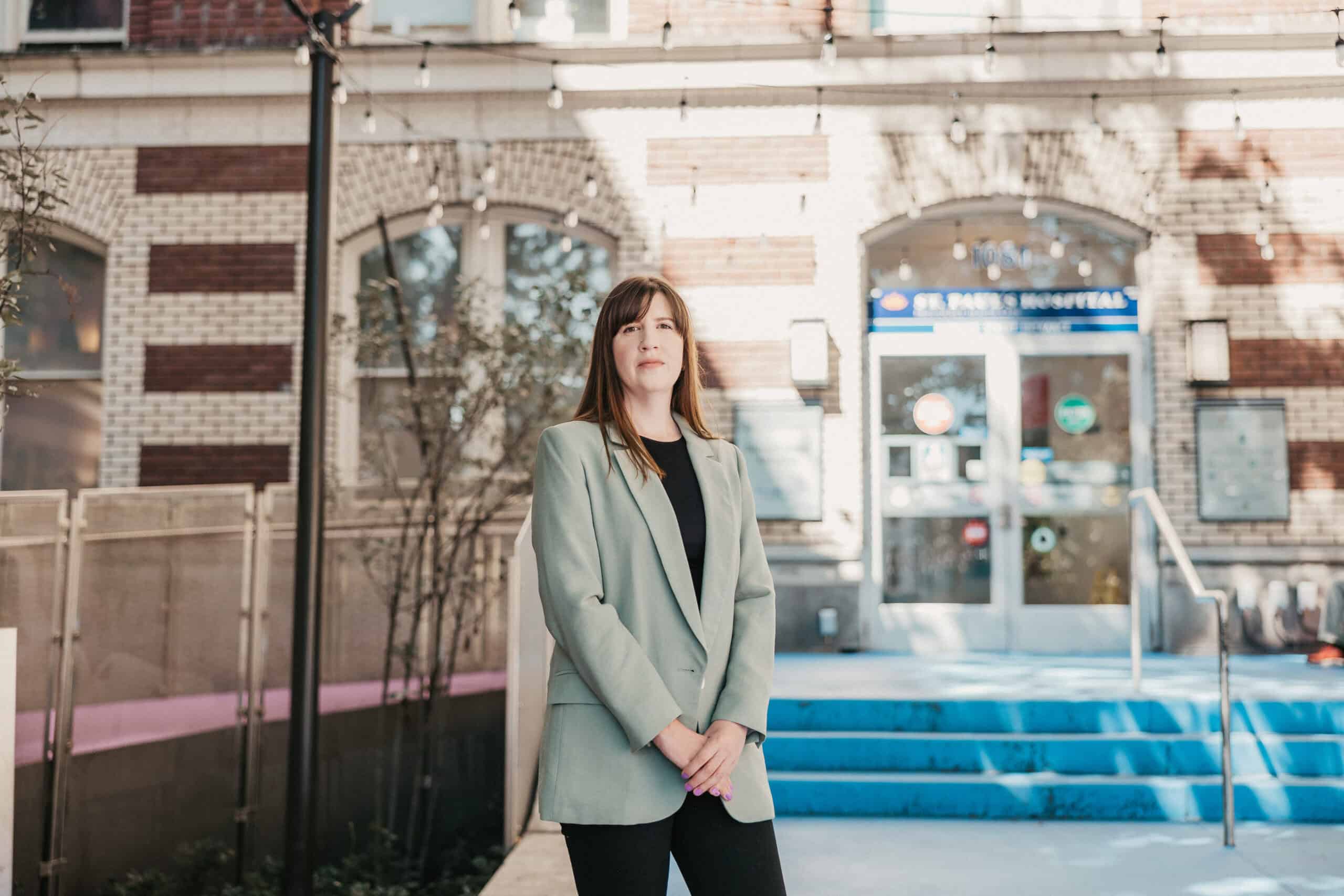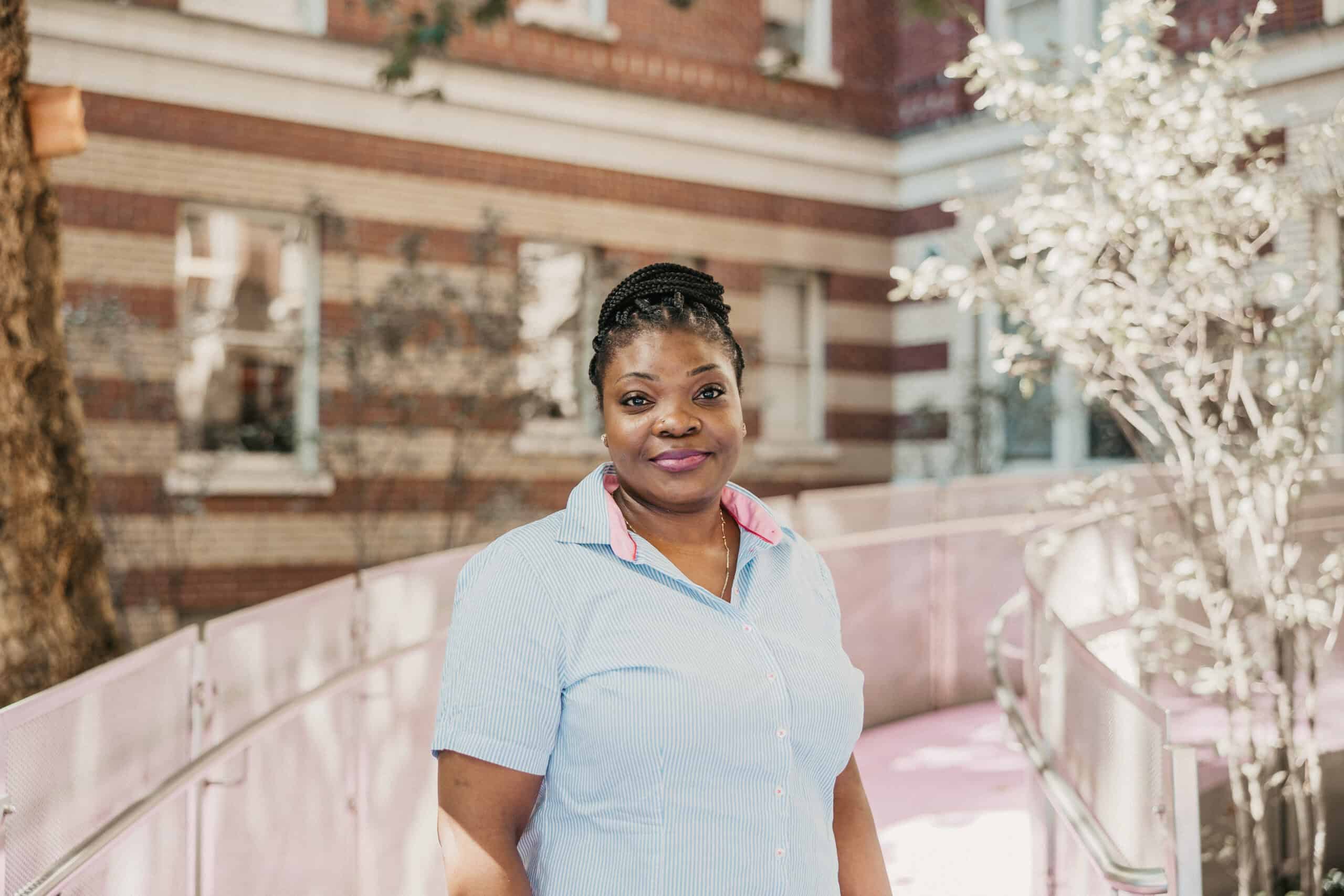Ajoke Adebowale describes herself as a quiet person who likes to be on her own. But when she began to have constant pain due to sickle cell disease, she could no longer stay silent.
Symptoms such as severe chest pain, difficulty breathing, trouble walking, backaches, and swollen hands and feet frequently affected her ability to function. For two years, she bounced around from one walk-in clinic to another, leaving with pain meds yet not the answers she desperately sought. That all changed when she was referred to the hematology department at St. Paul’s Hospital in 2019.
Ajoke immediately could feel Dr. Hayley Merkeley and the entire hematology team’s dedication and efforts to prioritize her health, working on appropriate treatments that met a wide range of needs. In addition to treating sickle cell disease, staff connected Ajoke with integrative care, like physiotherapy for leg pain and gastroenterology to address a severe ulcer.
“One thing they make sure that they do is listen to me,” Ajoke explains. “They are willing to help. When you call them or send them a message, they respond back with support and some kind of solution.”

Leadership in sickle cell disease care
Sickle cell disease (SCD) is a genetic red blood cell disorder. Irregular, c-shaped red blood cells become sticky and rigid, blocking blood flow and causing relentless pain – also known as “pain crises”. Often, patients must visit an emergency room to seek treatment for pain management. The disease may also cause head to toe chronic complications including strokes, blindness, renal failure, and respiratory failure.
The Red Cell Disorder Program at St. Paul’s Hospital is a leader in providing compassionate, patient-centric care to people with SCD and thalassemia across BC and the Yukon. This patient population is unique, comprised mainly of communities of colour who may be new immigrants or refugees.
In addition to the severe pain they experience as part of their health conditions, they can face economic challenges, systemic racism, and language barriers. Up to 60% of adults with SCD struggle with moderate to severe depression and 36% have severe anxiety, which are much higher rates than the general population.
“Studies have shown that people living with SCD have poorer quality of life than those receiving chemotherapy for cancer,” Dr. Merkeley says. “It is essential that patients receive compassionate care from a multi-disciplinary team to support their physical and psychological health.”
Since 2018, the number of patients seeking care for SCD at St. Paul’s Hospital has quadrupled. Many have medical trauma from negative experiences with the health care system, and patients frequently report that St. Paul’s is their preferred hospital due to the kind, empathetic, and understanding care they receive.
Ajoke counts herself as one of those patients. “I feel like their goal is to see me thriving,” she says. “Their proactive approach to my care has empowered me to take charge of my health and make informed decisions regarding my treatment.”
Clinical psychology brings hope and healing

Psychological support plays a crucial role in helping people coping with chronic diseases. It addresses the mental and emotional challenges that accompany long-term health conditions, such as anxiety, depression, and stress. It offers a safe space to express feelings, develop coping strategies, and enhance resilience. This not only benefits mental well-being, but also contributes to better physical health outcomes.
In 2021, hematology introduced a part-time clinical psychologist who visits patients in the Red Cell Disorder Program, as well as the hospital’s hematology/oncology clinic and Hemosiderosis Program. This service has dramatically improved care and quality of life for hematology patients.
Ajoke had a tough year in 2023 and spent an unusually long time in hospital. Whenever the hematology team visited, she’d end up breaking down in tears. Dr. Merkeley asked Ajoke if she’d consider seeing the department’s psychologist, Clare Carrigan.
Although initially apprehensive, Ajoke agreed – and is now thankful she did.
“Therapy was a first for me and I benefited a lot from it. I don’t trust people. When I started going, Clare allowed me to be me,” Ajoke recalls. “She didn’t force me to talk or do anything. She helped me understand that what I’m going through will pass and little by little, I gained trust. Then I started looking forward to meeting with her. She taught me how to connect to my own feelings, and that I can’t do everything by myself. Without her help, I don’t know how I would have survived some of the things that I went through.”
Through regular check-ups, personalized treatment plans, and access to leading-edge therapies like a new clinical trial drug, Ajoke has been able to better manage symptoms, reduce the frequency of pain crises that land her in the hospital, and avoid complications associated with SCD.
And for the first time, she’s optimistic.
“I was at a point where it was just too much for me. But now I have hope. I know that I can feel better.”
Donations to St. Paul’s Foundation bring compassionate care to patients and families across Providence Health Care and Providence Living sites, fund life-changing research, and underpin the future of health care at the new Jim Pattison Medical Campus.
On February 22nd we are celebrating the Year of the Snake at our 18th annual Scotiabank Feast of Fortune Gala. Join us and help drive medical innovation throughout BC, shifting health care from the ordinary to the extraordinary!
